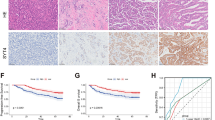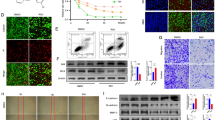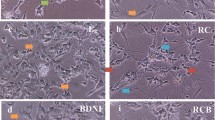Abstract
Resveratrol promotes differentiation and apoptosis of medulloblastoma cells by suppressing STAT3 signaling and a range of cancer-associated gene expression. However, Bcl-2, a common target of STAT3 and NF-κB signaling, is distinctly up-regulated in resveratrol-treated medulloblastoma cells, indicating potential effects of NF-κB in Bcl-2 expression and anti-medulloblastoma efficiency of resveratrol. To clarify this point, the status of NF-κB signaling and the consequence of NF-κB inhibition in UW228-2 and UW228-3 medulloblastoma cells without and with resveratrol treatment were evaluated by several experimental approaches. The results revealed that resveratrol activated NF-κB signaling in both cell lines at the 4-h treatment point, and the treated cells sequentially exhibited Bcl-2 up-regulation, neuronal-like phenotype with synaptophisin expression, and, eventually, apoptosis. Pyrrolidine dithiocarbamate (PDTC) treatment inhibited NF-κB activation and Bcl-2 expression and committed resveratrol-treated cells to apoptosis at the 8-h time point without the step of neuron-oriented differentiation. On the other hand, a single 50 μg/ml lipopolysaccharide (LPS) treatment activated NF-κB signaling accompanied with sustained proliferation and neuron-like differentiation. Tissue microarray-based immunohistochemical staining showed significantly different (P < 0.001) p65 nuclear translocation between the neurons of tumor-surrounding cerebella (10/10; 100%) and medulloblastoma tissues (20/117; 17.09%). Additionally, synaptophysin production was found in 83.64% of p65-positive and in 40.35% of p65-negative medulloblastoma cases. Our in-vitro and in-vivo results thus demonstrate the dual effects of NF-κB signaling on medulloblastoma cells by delaying resveratrol-induced apoptosis by up-regulating Bcl-2 expression or by involvement in neuronal-like differentiation in the absence of resveratrol. Therefore, appropriate inhibition of NF-κB activation may enhance the anti-medulloblastoma efficacy of resveratrol.




Similar content being viewed by others
References
Crawford JR, MacDonald TJ, Packer RJ (2007) Medulloblastoma in childhood: new biological advances. Lancet Neurol 6:1073–1085
Johnston DL, Keene D, Bartels U, Carret AS, Crooks B, Eisenstat DD, Fryer C, Lafay-Cousin L, Larouche V, Moghrabi A, Wilson B, Zelcer S, Silva M, Brossard J, Bouffet E (2009) Medulloblastoma in children under the age of three years: a retrospective Canadian review. J Neurooncol 94:51–56
Su X, Gopalakrishnan V, Stearns D, Aldape K, Lang FF, Fuller G, Snyder E, Eberhart CG, Majumder S (2006) Abnormal expression of REST/NRSF and Myc in neural stem/progenitor cells causes cerebellar tumors by blocking neuronal differentiation. Mol Cell Biol 26:1666–1678
Chang Q, Chen Z, You J, McNutt MA, Zhang T, Han Z, Zhang X, Gong E, Gu J (2007) All-trans-retinoic acid induces cell growth arrest in a human medulloblastoma cell line. J Neurooncol 84:263–267
Wang Q, Li H, Wang XW, Wu DC, Chen XY, Liu J (2003) Resveratrol promotes differentiation and induces Fas-independent apoptosis of human medulloblastoma cells. Neurosci Lett 35:83–86
Mokni M, Elkahoui S, Limam F, Amri M, Aouani E (2007) Effect of resveratrol on antioxidant enzyme activities in the brain of healthy rat. Neurochem Res 32:981–987
Yu LJ, Wu ML, Li H, Chen XY, Wang Q, Sun Y, Kong QY, Liu J (2008) Inhibition of STAT3 expression and signaling in resveratrol-differentiated medulloblastoma cells. Neoplasia 10:736–744
Tamatani M, Che YH, Matsuzaki H, Ogawa S, Okado H, Miyake S, Mizuno T, Tohyama M (1999) Tumor necrosis factor induces Bcl-2 and Bcl-x expression through NFkappaB activation in primary hippocampal neurons. J Biol Chem 274:8531–8538
Middleton G, Hamanoue M, Enokido Y, Wyatt S, Pennica D, Jaffray E, Hay RT, Davies AM (2000) Cytokine-induced nuclear factor kappa B activation promotes the survival of developing neurons. J Cell Biol 148:325–332
Denis-Donini S, Caprini A, Frassoni C, Grilli M (2005) Members of the NF-kappaB family expressed in zones of active neurogenesis in the postnatal and adult mouse brain. Brain Res Dev Brain Res 154:81–89
Marino S (2005) Medulloblastoma: developmental mechanisms out of control. Trends Mol Med 11:17–22
Sun C, Hu Y, Liu X, Wu T, Wang Y, He W, Wei W (2006) Resveratrol downregulates the constitutional activation of nuclear factor-kappaB in multiple myeloma cells, leading to suppression of proliferation and invasion, arrest of cell cycle, and induction of apoptosis. Cancer Genet Cytogenet 165:9–19
Uchida Y, Yamazaki H, Watanabe S, Hayakawa K, Meng Y, Hiramatsu N (2005) Enhancement of NF-kappaB activity by resveratrol in cytokine-exposed mesangial cells. Clin Exp Immunol 142:76–83
Keles GE, Berger MS, Srinivasan J, Kolstoe DD, Bobola MS, Silber JR (1995) Establishment and characterization of four human medulloblastoma-derived cell lines. Oncol Res 7:493–503
Przyborski SA, Smith S, Wood A (2003) Transcriptional profiling of neuronal differentiation by human embryonal carcinoma stem cells in vitro. Stem Cells 21:459–471
Jung EM, Lee TJ, Park JW, Bae YS, Kim SH, Choi YH, Kwon TK (2008) The novel phospholipase C activator, m-3M3FBS, induces apoptosis in tumor cells through caspase activation, down-regulation of XIAP and intracellular calcium signaling. Apoptosis 13:133–145
Ikeguchi M, Kaibara N (2001) Changes in survivin messenger RNA level during cisplatin treatment in gastric cancer. Int J Mol Med 8:661–666
Grotzer MA, Hogarty MD, Janss AJ, Liu X, Zhao H, Eggert A (2001) MYC messenger RNA expression predicts survival outcome in childhood primitive neuroectodermal tumor/medulloblastoma. Clin Cancer Res 7:2425–2433
Araki Y, Okamura S, Hussain SP, Nagashima M, He P, Shiseki M, Miura K, Harris CC (2003) Regulation of cyclooxygenase-2 expression by the Wnt and ras pathways. Cancer Res 63:728–734
Sun Y, Chen XY, Liu J, Cheng XX, Wang XW, Kong QY, Li H (2006) Differential caspase-3 expression in noncancerous, premalignant and cancer tissues of stomach and its clinical implication. Cancer Detect Prev 30:168–173
Li H, Sun Y, Kong QY, Zhang KL, Wang XW, Chen XY, Wang Q, Liu J (2003) Combination of nucleic acid and protein isolation with tissue array construction: using defined histologic regions in single frozen tissue blocks for multiple research purposes. Int J Mol Med 12:299–304
Malanchi I, Peinado H, Kassen D, Hussenet T, Metzger D, Chambon P, Huber M, Hohl D, Cano A, Birchmeier W, Huelsken J (2008) Cutaneous cancer stem cell maintenance is dependent on beta-catenin signalling. Nature 452:650–653
Schreck R, Meier B, Mannel DN, Droge W, Baeuerle PA (1992) Dithiocarbamates as potent inhibitors of nuclear factor kappa B activation in intact cells. J Exp Med 175:1181–1194
Tsujimoto Y (2003) Cell death regulation by the Bcl-2 protein family in the mitochondria. J Cell Physiol 195:158–167
Chiou SH, Ku HH, Tsai TH, Lin HL, Chen LH, Chien CS (2006) Moclobemide upregulated Bcl-2 expression and induced neural stem cell differentiation into serotoninergic neuron via extracellular-regulated kinase pathway. Br J Pharmacol 148:587–598
Aggarwal BB, Bhardwaj A, Aggarwal RS, Seeram NP, Shishodia S, Takada Y (2004) Role of resveratrol in prevention and therapy of cancer: preclinical and clinical studies. Anticancer Res 24:2783–2840
Yeung F, Hoberg JE, Ramsey CS, Keller MD, Jones DR, Frye RA, Mayo MW (2004) Modulation of NF-kappaB-dependent transcription and cell survival by the SIRT1 deacetylase. EMBO J 23:2369–2380
Zhong H, May MJ, Jimi E, Ghosh S (2002) The phosphorylation status of nuclear NF-kappa B determines its association with CBP/p300 or HDAC-1. Mol Cell 9:625–636
Mattson MP (2005) NF-kappaB in the survival and plasticity of neurons. Neurochem Res 30:883–893
Hayden MS, Ghosh S (2004) Signaling to NF-kappaB. Genes Dev 18:2195–2224
Wang Q, Li H, Liu N, Chen XY, Wu ML, Zhang KL, Kong QY, Liu J (2008) Correlative analyses of notch signaling with resveratrol-induced differentiation and apoptosis of human medulloblastoma cells. Neurosci Lett 438:168–173
Shu XH, Li H, Sun Z, Wu ML, Ma JX, Wang JM, Wang Q, Sun Y, Fu YS, Chen XY, Kong QY, Liu J (2010) Identification of metabolic pattern and bioactive form of resveratrol in human medulloblastoma cells. Biochem Pharmacol 79:1516–1525
Acknowledgments
We gratefully acknowledge J.R. Silber for providing UW228-2 and UW228-3 cells. We thank Professor Xiang-Hong Yang for providing human medulloblastoma specimens. This work is supported by the grants from National Natural Science Foundation of China (nos. 30527002, 30670946, 30971038, and 81072063) and by the special fund for Liaoning Provincial Laboratory (no. LS2010055).
Author information
Authors and Affiliations
Corresponding author
Rights and permissions
About this article
Cite this article
Wen, S., Li, H., Wu, ML. et al. Inhibition of NF-κB signaling commits resveratrol-treated medulloblastoma cells to apoptosis without neuronal differentiation. J Neurooncol 104, 169–177 (2011). https://doi.org/10.1007/s11060-010-0496-y
Received:
Accepted:
Published:
Issue Date:
DOI: https://doi.org/10.1007/s11060-010-0496-y




